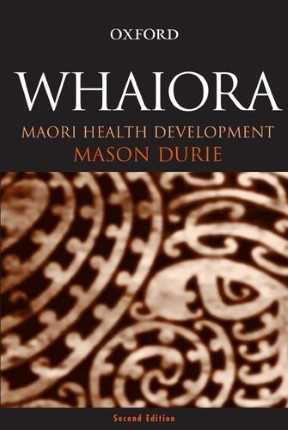
Whaiora, Māori Health Development – Mason Durie (1994)

Today’s book by Sir Mason Durie, marks the 50th publication to be highlighted. Whaiora is the first of a series of Sir Mason Durie’s scholarly publications in Māori health. It documents progress in Māori health development over the previous century and remains an influential publication for a growing Māori health workforce, for Māori health researchers and Māori community organisations.
Publication details
Durie, M. Whaiora, Māori Health Development. Oxford University Press, 1994.
About the book
Whaiora by Sir Mason Durie (Rangitāne, Ngāti Kauwhata, Ngāti Raukawa) was launched at the Hui Whakapumau of 1994, in a climate where the Māori present were both deeply aware of the opportunities being offered by the 1993 changes to the health system and concerned about the impacts that years of economic shocks were having on the health of iwi, hapū and whānau. Whaiora could not have been published at a better time.
The many interwoven themes in Whaiora can best be summed up in Durie's own introduction: "Māori health development is essentially about Māori defining their own priorities for health and then weaving a course to realise their collective aspirations".
The book reminds us that in Te Ao Tawhito an integrated view of health was central to the functioning of Māori society. Whaiora narrates stories of the tupuna who fought for the right to define what Māori health was, and who struggled to realise their visions. It also offers a series of frameworks for Māori health, including Durie’s own significant Te Whare Tapa Whā model, that would go on to have a major impact on the growing body of Māori health workers, Māori community organisations and Māori researchers.
Whaiora was an influential first publication for Sir Mason Durie, so influential in fact that it was reprinted four times over the four years between the first edition of 1994 and the revised edition in 1998. Whaiora is the first of six books Sir Mason Durie has written relating to Māori health, Māori development, indigeneity, and Māori futures. He has a strongly identifiable scholarly style that guides conceptualisations of Māori health and wellbeing by developing Treaty of Waitangi applications, projecting futures thinking, producing research relevant to Māori and indigenous peoples and generating creative responses to community needs.
Further information
This publication is part of the series Te Takarangi: Celebrating Māori publications - a sample list of 150 non-fiction books produced by a partnership between Royal Society Te Apārangi and Ngā Pae o te Māramatanga.
